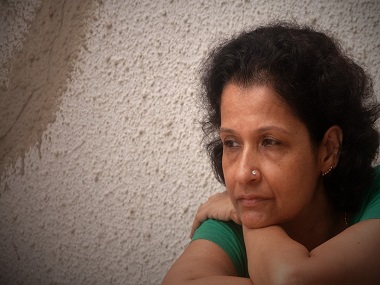Editor’s note: Given the recent news of filmmaker and producer Karan Johar becoming a father to twins via surrogacy, we are republishing this interview with Pinki Virani.
After Bitter Chocolate and Aruna’s Story, noted author and journalist Pinki Virani is back with a new book. Politics Of The Womb, published by Penguin Randomhouse, draws on wide-ranging investigation and research to present what is being called the first-ever expose of the workings of the reproduction industry.
Excerpts from Firstpost’s interview with Pinki Virani:
Politics of the Womb — The Perils Of Ivf, Surrogacy & Modified Babies is being lauded for bringing up, for the first time, uncomfortable issues surrounding IVF and commercial surrogacy along with other assisted reproduction dangers. Your research was triggered by a news item on America’s National Centre for Disease Control receiving reports about ‘broken IVF babies’. Was that the most compelling factor in prompting you to write this book?
The baby and its mother, both. Every step of the way thereafter became as if an outside force was compelling me. I had no choice but to follow through as each disquiet upon being investigated, led to other sets of unease. What made it most problematic was what was being done to a woman’s body in the name of an unborn and frighteningly, she simply wasn’t there — she was not being considered at all, it was as if her very being had been medically erased.
When I finally sat down to write, my concern was that there was so much jargon pretending to be in patient interest but it still wasn’t about the real well being of a woman and a child. So I went back, down all those tangled lines to unravel threads which would put the woman as a human being right up front. And thanks to all those experts who patiently answered — from Australia, Canada, China, Denmark, Europe, India, Israel, Sweden, United Kingdom, United States — I was able to write a book that is being read universally by all ages, regardless of gender.
It was heartening when I was told by a translator, “This is a very big book [more than 1,10,000 words> but it is easily understandable.” Politics of the Womb – The Perils Of Ivf, Surrogacy & Modified Babies (POW) is being translated into Malayalam by Current Books and into Marathi by Mehta Publishing.
What was the time frame you invested in the research and writing for POW?
When I was sorting out the material I realised I had notes dating from 2007. POW is updated till almost the last-minute before it went to the printing press for its release on 1 September. The main chapters had closed so I created another to put in the most updated information on the broken babies and their breaking mothers. This includes a heightened cancer risk for the woman. Plus a study that when a hole is made, by the lab, in the embryo (which is what forms when sperm and egg successfully unite) for better “hatching” post-implantation in the uterus, it does not really help the outcome. If anything, the risks of deformities increase in the baby.
At the very start of POW, you point out the differences in the terms commonly used to describe male and female infertility: ‘sterile’ for men but ‘barren’ for women. The words we use seem to be symbolic of the difference in attitudes towards men and women when it comes to human reproduction.
Too true. What further compounds it — thereby leading even more to the woman carrying the entire burden of ostensible “infertility” — is the ridiculous notion that the man should not be made to feel even more upset than he is societally expected to be for not having progeny, since his manhood is inextricably tied to his sperm-count. This is a stone-age way of perceiving reproduction, there happens to be much more in this moving-along world other than the black-white of infertile-fertile.
Which is why POW also brings up fatherhood-by-choice and suggests that women support it, just as they do motherhood-by-choice. There is absolutely no reason why a man should be made to feel impotent just because he is involuntarily, or voluntarily, child-free. It’s archaic to assume that he must feel apologetic about not being a parent and thereby necessarily prevent himself from being a thinking, living, breathing human being, a good man and a good husband.
By most reports the surrogacy ‘industry’ in India has been ‘booming’. This means the generating of a lot of money and a fair amount of attention. Yet, it escaped the scrutiny which it should have received. Agreed, there were no laws nor were there clear-cut regulations but there were guidelines and these have, clearly, not been followed by a section of the ‘repro tech’ industry…
Everywhere, not just in India, where there are no proper laws which are strictly enforceable, medicos in it only for the money do not feel obliged to voluntarily do that which is right by the woman-patient. They make money in the name of the baby, many babies. And they keep it a secret that the real IVF failure rate is very, very high. Meanwhile they charge per IVF-cycle or, as in some cases, per embryo insertion neither of which necessarily leads to the “take-home” baby.
The hype of the baby has been so high, the hope around it so exaggerated, that the repro tech lobby has escaped all scrutiny to date. Apart from the Surrogacy Bill, there also needs to urgently be an updated ART Act to regulate the several mom-pop type fertility-shops that have sprung up all over the country. They run a brisk business pretending to perform assisted reproduction and harvesting large quantities of oocytes from women’s bodies. Artificial reproduction has much larger implications, both cultural and ethical, than those who buy into it perceive. Repro tech has socio-political ramifications not only on women and children but also men, their families, societies, countries. Effective national laws need to encompass this.
Have celebrity cases — Aamir Khan, Shah Rukh Khan, Tusshar Kapoor — helped in generating a dialogue around the medico-socio-legal issues surrounding IVF and surrogacy? Or have they had the opposite effect?
Ah, certain sections of permanently-patriarchal Bollywood even as it wears the mask of modernity. Selectively setting up half-truths and untruths as villains only so that they can be vanquished by their own hero-avatars. And in the process romanticising violence. In the case of third-party reproduction it is acute hormonal violence, an onslaught on another woman’s womb, hyper-medicalised, to produce a son.
You say that this is a book about an individual’s right to informed choice. What are the choices and rights which were simply not being talked about (with respect to surrogacy/IVF)?
The baby’s right to be breastfed, starting with the first-hour all-important base-feed called colostrum, all of which is denied to it in commercial surrogacy. The biological mother’s right to bond immediately after the baby’s birth and breastfeed it, denied to her when she is turned into the “IVF-package” of elective caesarean surgeries.
The false pressure on all young people that parenthood is the only way to responsible adulthood. The inexplicable comment that women, even when single by choice and content in their lifestyles, can only feel “complete” when there is reproduction, either natural or artificial.
The surreal insistence by supposedly “single men” to bring a defenceless, very vulnerable and instinctively-needing-its-mother baby into this world without a mother. Make that two mothers in the case of “single men” who are paying to assert phallic privilege via in vitro. A biological mother, as almost all humans have, combines both: the genetic (egg or oocyte-giving) mother and the all-important act of carrying the foetus for nine months, safely and securely, in her own body while helping it breathe and grow and priming it with gentle maternal-hormonal showers, and then delivering it as a birth-mother. That poor mite forced to come into this world through repro tech and commercial surrogacy has two mothers: the oocyte-seller and the surrogate who is its birth-mother. Likely it will not be allowed to know neither. Poor, rich baby; paid to be brought into existence as an intentional fifty-percent orphan.
POW raises a very important point that hasn’t been talked about before — how commercial surrogacy leads to commodifying the girl child. It also weaves in the social ramification that stories of surrogacy do not say, such as what the children from families where the mother is a commercial surrogate, feel about the circumstances… What are some of the other social questions overlooked when talking of commercial surrogacy?
Hopefully India’s political parties will come together in the next few months to pass the Surrogacy Bill into an Act. Hopefully, they will understand that there can be no more commercial surrogates for they are someone’s biological mothers, and harm cannot be wilfully done to mothers. POW lists all the downsides to the surrogate, her physical body and her mental health; these dangers will not go away even if they are paid the real market rate (around US $ 40 to 50 thousand) as charged in those few American states which have not yet banned commercial surrogacy. Hopefully the political parties will understand that to not outlaw commercial surrogacy is to allow Indian daughters — and not just from the poor class — to be streamlined into the system as future commercial surrogates. And above all, hopefully all of India’s political parties will come together to understand, once and for all, that to allow the placement of a woman’s body parts in the marketplace — sub-divided as uterus, ova — only for the revenue it can generate is the worst kind of patriarchy posturing as pro-woman choice.


)




)
)
)
)
)
)
)
)